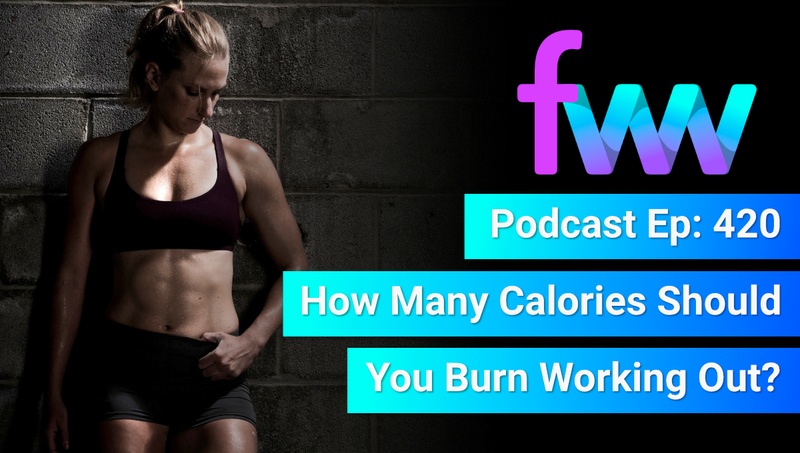To lose weight, you have to burn more calories than you take in.
You HAVE to be in a caloric deficit.
Despite what you may hear out there... this is a fact.
There are two ways to do that:
-
Cut the amount of calories you eat
-
Increase the amount of calories you burn
Of course, exercise is one of the way to burn those extra calories.
A podcast listener asked... and it's a great question... especially these days.
Fitness watches are notorious for VERY inaccurate calories burned numbers.
The answer might surprise you.
Q: If trying to lose weight, how many calories should I burn during a workout?
A: Don't worry about exercise calories... just exercise consistently.
There is no magic number for how many calories you should burn in a workout session.
And that's for a couple of reasons...
1. Calorie Trackers Like iPhones, Fitbits, Garmins Aren't Accurate.
In fact, a 2017 study found that FitBit was off by nearly 27% !
Other studies here and here ... have show watches can be off by 40% to 80%.
Look at that...
They're accuracy (if you call it that) is all over the board.
It's not the watch's fault.
There is no way of determing how many calories you'll burn based on heart rate and time.
Fitness watches should be used to show you a trend line.
-
How many calories am I burning on Monday workouts compared to Thursdayd workouts?
-
Does this trend help me hit my goals?
2. Workouts Burn Different Amounts of Calories
If your goal is to burn as many calories as you can in the shortest amount of time, running would win (or other form of cardio).
But burning as many calories in one workout session shouldn't be the goal and here's why:
You can burn around 600 calorie in a hour of running.
But when the run is over, the calorie burn is over.
However, if you do an hour of strength training...
Your watch may tell you you only burned 380 calories.
Does this mean in order to lose weight, you should focus on cardio and neglect strength?
NO!
In fact, if you're going to focus on one more than another, the strength training is winner.
-
Strength training may burn less calories during the actual workout, but because of stress on muscles and the body's need to recover... your body continues burning more than 48 hours later helping your body recover.
-
Strength training tells your body you need your muscles! Your body doesn't want to be in a caloric deficit.
When you are under fueling, your body tries to bring down it's BMR (resting metabolism) to meet what you're giving it.
And the easiest way is to break down muscle. Muscle takes a lot of calories to sustain.
You want your muscle!
If you stay consistent with strength training AND eating enough protein (.8 to 1 gram per pound you weigh), you're more likely to keep the metabolism roaring and body breaking down fat instead.
Focus On Food & Consistency
If you want to lose weight... you have put yourself in a calorie deficit.
But you have to strength train or your body will start burning muscle mass.
If you strength train... you'r body will start to use fat for added calories... but even then not always.
So focus on making your workouts count:
-
Challenge yourself with weight and intensity. Aim to progressively lift heavier .
-
Change workouts. Keep your body guessing as to what you'll give it next... metabolic... go heavy... go light... go fast... go slow... mix and match your way to results.
-
Workout 4-6 days a week for 30-60 minute sessions.
-
Stay active throughout the day... move as much as you can.
Here's What I Track?
-
Resting heart rate. My resting heart rate is normally low-mid 50s. If it goes up to around 60, I know I am either over stressed, over tired, or over trained. I take it easy for a day or two and guess what? My heart rate goes back down.
-
Steps. I love a good step challenge and each week I try to get more steps than the previous. Just for fun. If I don't hit it, then that becomes the new number to hit the next week so I'm always climbing up.
And that's it!
